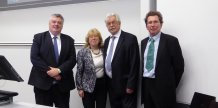
Pictured (L-R) Professor James Devenney, Professor Norbert Reich and his wife, Professor Mel Kenny
38th Lasok Lecture on EU law
The Centre of European Legal Studies had the pleasure of welcoming Prof Norbert Reich (Emeritus Professor of German and EU Private and Economic Law, Bremen) to deliver the 38th Lasok Lecture on 29 April 2015.
"'In his lecture “EU Citizenship - Progressive Concept or Regressive Failure?” Prof. Reich described the Court of Justice of the European Union’s (CJEU) ‘indeterminate’ law on free movement and citizenship and the problems encountered throughout the EU in demarcating solidarity in the fields of education (inter alia in Case C-147/03 Commission v Austria on admission to medical school and Case 39/86 Lair v Universität Hannover and Case C-209/03 Dany Bidar (on the degree of integration necessary to access student loans)) and, in contrast, social security (widely discussed in the UK in terms of ‘benefits tourism’).
On student mobility rights, Professor Reich noted the stark contrast to the US, which allows “home state” advantages to US students. Professor Reich also highlighted the contribution of the British Advocate-General Jacobs to an individualistic understanding of free movement in his appeal ‘civis europeus sum’ in Case C-168/91 Christos Konstantinidis. Professor Reich went on to juxtapose the higher education cases with access to social benefits and children’s free movement analysing inter alia Case C-434/09 McCarthy, Case C-49/09 Ruiz Zambrano as well as Case C-200/02 Zhu.
Professor Reich developed his analysis with a third step: a critical analysis of the “award” or “sale” of residence permits and citizenship rights to third-country nationals with either no or a minimal link to the “host” Member State. Professor Reich noted that while Union citizenship has thus come to be seen as the “fundamental status of nationals of Member States” (Case C-184/99 Grzelczyk), that citizenship, following Case C-369/90 Micheletti, is awarded exclusively by EU Member States; only its withdrawal can be controlled on proportionality grounds via EU law (Case C-135/08 Rottmann).
According to a recent report, Malta awards citizenship privileges to non-nationals investing €1.15 million; Portugal sells “golden visas”, linked to inbound investment; Bulgaria extends residence permits to investors with €1 million, citizenship may be acquired after a year; Cyprus requires investments of €3 million (€2 million for Russian nationals); Austria has a special program for “exceptional services for the country”; “Golden visas” are offered by Croatia, Spain, Greece, Hungary and Latvia at differing prices and conditions.
Prof Reich argued that such practices turn the idea of EU citizenship on its head. Since it is usually linked to “investment” and limited to the country awarding the “golden passport” it seems to be a flagrant violation of the rules on free movement of capital which forbid any provisions of national law granting privileges linked to investments in national projects; “normal” investments are deterred and discriminated against because they do not enjoy the special status of “golden passports”. Prof Reich argued that the principles of the “golden share” case-law should be applicable in such cases.
Furthermore, Professor Reich argued that the practice of “buying” EU citizenship is an abuse of the citizenship concept itself and should be challenged as a violation of the principle of “sincere cooperation” under Article 4 (3) TEU. The practices seem a clear violation of the spirit of Union citizenship which requires a genuine link to the host country. Moreover, as Professor Reich went on to observe it is frequently the Schengen privileges which attract the third-country investors such that while the “hosts” attract the investments, other Member States are left with the externalities. Professor Reich finished by questioning whether social justice and protection are “promoted” by selling citizenship and free movement rights to a few “rich” citizens from non-member countries who don’t have a genuine link with the sponsoring country except perhaps their host country bank accounts?"
Professor Mel Kenny
Date: 7 May 2015
